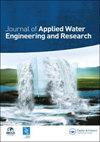Reservoir operations under uncertainty with moving-horizon approach and ensemble forecast optimization
IF 1.6
Q4 WATER RESOURCES
Journal of Applied Water Engineering and Research
Pub Date : 2023-11-07
DOI:10.1080/23249676.2023.2276948
引用次数: 0
Abstract
AbstractInflow forecasts are a basic pre-requisite to support decisions for anticipating reservoir operations. The fact that hydrological forecasts are uncertain, noting that reservoirs often fulfill multiple purposes, bears the risk of non-ideal reservoir operation. Optimization techniques can help to identify the best operational scheme under given inflow. To address the forecast uncertainty, operators can repeat optimization (moving horizon approach) and optimize for inflow forecast ensembles. This article aims to contribute to a better understanding of how the different methods work, how to interpret the results and what the effect of user choices on the optimization results is. The moving-horizon approach and three ensemble optimization methods were applied on a hydropower reservoir in Norway under flood conditions. The functional principle of each method is explained, and advantages and drawbacks of the different methods are discussed with the help of performance indicators.Keywords: Reservoir optimizationflood forecastingensemble forecastRTC-Toolsmodel predictive controlstochastic optimization Disclosure statementNo potential conflict of interest was reported by the author(s).不确定条件下的移动层位方法及集合预测优化
摘要入流预测是支持水库运行预测决策的基本前提。由于水文预报具有不确定性,水库往往具有多种用途,因此存在水库运行不理想的风险。优化技术可以帮助确定给定流量下的最佳作业方案。为了解决预测的不确定性,作业者可以重复优化(移动层位法)并优化流入预测组合。本文旨在帮助您更好地理解不同的方法是如何工作的,如何解释结果以及用户选择对优化结果的影响。以挪威某水电站为研究对象,在洪水条件下应用了移动水平面法和3种集合优化方法。阐述了每种方法的功能原理,并借助性能指标讨论了不同方法的优缺点。关键词:油藏优化洪水预测组合预测tc - tools模型预测控制随机优化披露声明作者未报告潜在利益冲突
本文章由计算机程序翻译,如有差异,请以英文原文为准。
求助全文
约1分钟内获得全文
求助全文
来源期刊

Journal of Applied Water Engineering and Research
WATER RESOURCES-
CiteScore
2.90
自引率
16.70%
发文量
31
期刊介绍:
JAWER’s paradigm-changing (online only) articles provide directly applicable solutions to water engineering problems within the whole hydrosphere (rivers, lakes groundwater, estuaries, coastal and marine waters) covering areas such as: integrated water resources management and catchment hydraulics hydraulic machinery and structures hydraulics applied to water supply, treatment and drainage systems (including outfalls) water quality, security and governance in an engineering context environmental monitoring maritime hydraulics ecohydraulics flood risk modelling and management water related hazards desalination and re-use.
 求助内容:
求助内容: 应助结果提醒方式:
应助结果提醒方式:


